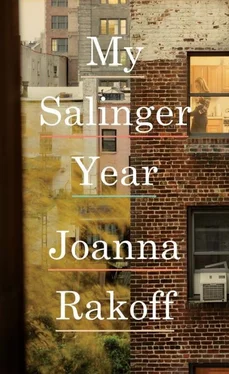As the door clicked, I slid open the cold metal drawer and fingered the ragged white sheets. I’d read this letter a dozen times now, unsure of how to respond. I still wasn’t sure what to say. Wouldn’t it be better to simply pass the note on to Salinger and let him decide?
My boss’s door remained closed for a long time, long enough that I eventually slipped out to buy my sad little salad. When I returned, the door was open and they were gone. An hour later, she returned alone. The letter would remain in my desk.
Two days later, on Saturday, a large, red-faced man with a flattop arrived at our apartment with a box. “Hello,” he said, then gestured inexplicably toward the interior of the apartment. Some hours later, an odd, archaic-looking metal contraption was installed on our front wall. “How do you turn it on?” I asked.
“No!” he said vehemently, with another inexplicable gesture. I held up my hands in surrender.
A moment later, Kristina arrived, as always clad in her red nylon track jacket. “Hello, wife!” she cried, taking my hand. Immediately, she and the man—her husband, presumably—began arguing loudly in Polish. I retreated to the couch. “Wife,” she cried, after a good ten minutes. I stood up. “This is the heater. It needs to be hooked up to gas. But my husband forgot pipe. He will come back tomorrow with pipe and hook it up. Okay?”
“Great,” I said, trying to muster some enthusiasm. How could this little box heat an entire apartment? I had never seen a heater that looked anything like this.
“But it’s warm in here,” she cried, smiling. “Whew! So warm! You’ll be fine until then, yes?”
Don and I—in shifts—waited home all Sunday, but Kristina’s husband never arrived. On Monday, I called Kristina and asked what was going on. “He had trouble finding right pipe, but he has it now,” she assured me. “He’ll be there tomorrow.”
“I’ll be at work tomorrow, though,” I said. “I won’t be able to let him in.”
“We have key. He’ll let himself in.”
“Okay,” I said nervously. My parents had a strict policy against unsupervised strangers in the house.
“Oh my God, Buba,” Don cried, when I expressed concern. “What? Do you think he’s going to steal something?”
All day Tuesday I tried not to worry. The minute the clock hit five thirty, I raced out the door. Half an hour later, I was on our block, where the air had a strange, unprecedented scent, one I couldn’t place. I unlocked the door to the front house, grabbed our mail, then walked through the door to the courtyard, where it hit me full on: gas. The courtyard was full of gas. Gas so thick my eyes immediately began to water. Gas so thick I could actually see it, swirling through the air. It had happened, I thought, my worst fear. Don had come home and turned on the stove. The wind had knocked the pilot out and gas was pouring out of the stove. Don was possibly dead. Or near dead. Except that Don wasn’t supposed to be home until much later. He was working, then going to the gym. But he could have changed plans. Been fired. Anything.
For a moment, I stood in the courtyard—staring dazedly at its cracked concrete center—unsure of what to do. Then I ran up the steps, trying not to breathe, and unlocked the outer door, then the door to our apartment, where the gas was so thick my head immediately began to fog over. The stove was closed. Closed and off. As in a horror movie, I slowly turned around. There was the new heater, a fierce flame burning in the little window on its lower left corner. From its bottom, a thick pale-blue pipe now extruded before jogging and running parallel to the floor. Beneath this pipe lay a puddle, a puddle steadily growing as the pipe above dripped and spurted something that looked like water but thicker. A puddle just perhaps eight inches from that flame.
Brooklyn Union Gas came quickly. “If you had stayed at work an hour later,” the serviceman told me, “the building would have blown.”
“Was it just installed wrong?” I asked, rubbing my hands together. I’d been sitting on the stoop of the front building waiting for their blue truck to pull up.
“They used water pipe instead of gas pipe,” he said. “Kind of unbelievable. The gas ate right through the pipe. And with that open flame—” He shook his head. “I’ve never seen a heater like that before. I can’t imagine where they bought it. Definitely not the local hardware store.” With a thumb, he gestured to the corner, where there was, in fact, a hardware store. “Looks like it was manufactured forty, fifty years ago. Or in another country.” Poland , I thought.
“Is it safe?” I asked.
“Safe?” He looked at me as if I’d just asked whether the sky was blue, squinting one eye and smiling a little. He had a broad jaw and blue eyes set amid a spray of creases. “No, I wouldn’t say that heater is safe. I mean, it has an open flame. You walk by it, poof, your coat’s on fire. And that’s just the most basic problem. Even if they set it up properly, what if there’s a leak somewhere else? You’re better off with a space heater. Or just being cold.” He looked at me, standing up a bit straighter and cocking his head to the side. “You live there alone? In that”—sucking in a bit of gas-tinged air, he cocked his head toward the house—“ place ?” I sensed that he had been restraining himself from saying “dump.”
“No, no,” I told him quickly. “I live with my boyfriend.”
His head was still cocked slightly toward the house as he continued to look at me, nodding. Then, in one sudden, elegant gesture, he stood up straight again and placed his hands in his pockets, so his arms curved out like wings. “Your boyfriend should take better care of you,” he said, pulling his keys out of his pocket. “All right. Let the place air out for at least two hours. We opened all the windows for you. You have somewhere to go?” I nodded. I could go to the L, I supposed, or around the corner, where my friend Cate had just taken a huge railroad flat. “Good night,” he said. “Keep the windows open all night. Let the place air out. You need fresh air, even if it’s cold.”
“Fresh air,” I called as he got in the truck and started it. “Got it. Fresh air.”
At the end of the month, Max again took me along to a reading at KGB, where we sat with a convivial group of young editors and writers who lingered—as was not often the case—long after the reading ended, drinking whiskey with soda backs. “What the hell do you do all day for your boss?” he asked. “I mean, what does she do all day back there? Other than smoke and talk on the phone.” I stared at him, blinking, a smile frozen on my face, unsure of what to say. My silence must have cowed him, for he took a bracing sip of whiskey and waved his hands in a gesture of apology. “Forget I said that. Things have been a little tense lately.” He’d been in and out of my boss’s office more often recently, often shouting. Max was up for partner, and it seemed that there were issues with the negotiations. I wasn’t sure, but I suspected this had something to do with the Agency’s old-fashioned cooperative system, in which agents’ salaries were based on seniority rather than sales. At any other agency, Max—with his vast, fantastic client list and his million-dollar deals—would be among the highest-paid agents, but not so at the Agency, where the pot was divided equally. To become a partner, too, he would have to pay into the Agency, though I didn’t know how much. Surely more than my entire salary. I wasn’t entirely sure why he stayed. “I do wonder,” he said, looking not at me but at the wall, where a Soviet-era poster—a woodblock print of a worker holding some sort of hammer-like implement—hung just above our heads. “I do wonder what she does. ’Cause she’s certainly not selling books.” A muscle tensed in his jaw. Suddenly he turned to me, a terse smile creating creases at the sides of his mouth. He looked tired. “What? Is she just, you know, sending threatening letters to everyone who mentions Salinger’s name on his Web page?”
Читать дальше












